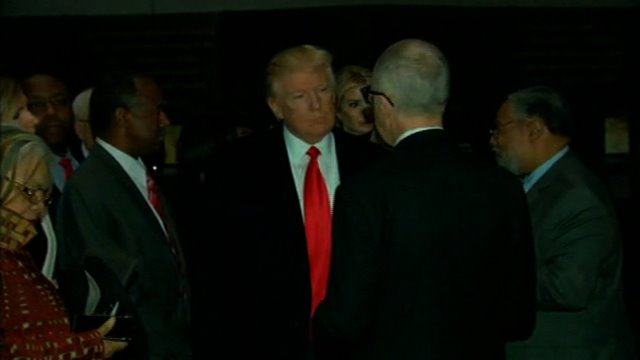President Donald Trump visited the National Museum of African American History and Culture for the first time on Tuesday morning.
He was joined by daughter, Ivanka Trump, Housing and Urban Development nominee Ben Carson and his wife, Candy Carson, Sen. Tim Scott, R-South Carolina, and presidential aide and former “Apprentice” contestant Omarosa Manigault, among others.
The visit was arranged by Manigault, a source familiar with the visit said. The source added that the visit was originally penciled in for mid-January but was effectively nixed at that time by the Secret Service, citing security concerns.
Trump’s visit to the museum, which opened last September, coincides with Black History Month. Trump first marked the event at the beginning of the month hosting a listening session with what the White House described as African-American leaders.
The attendees did not include leaders from top African-American advocacy groups such as the NAACP or the National Urban League, but instead featured Trump sitting alongside several of his campaign’s top black supporters and members of his administration, including Carson and Manigault.
Last week, Trump again drew questions as he touted his outreach efforts, claiming that Rep. Elijah Cummings, a Democratic member of the Congressional Black Caucus, canceled a meeting with Trump because it would be “bad politics.”
Cummings said the story was completely false and that the Congressional Black Caucus had tried to set up a meeting with Trump through the White House without success.
Trump also drew criticism when during his news conference last week asked April Ryan, a veteran White House reporter who is black, if she would help set up a meeting with the black caucus, which Ryan is not affiliated with.
Trump is the second member of the first family to attend the months-old museum in just a week. First lady Melania Trump visited the museum last week with Sara Netanyahu, wife of the Israeli Prime Minister Benjamin Netanyahu.
Trump made a concerted effort to reach out to African-American voters during the campaign, including through events hosted by his National Diversity Coalition and alongside Carson, the prominent black neurosurgeon who endorsed Trump after dropping out of the GOP primary race.
But Trump’s black outreach often came under fierce criticism during the campaign.
With the exception of two visits to predominantly black churches — one in Michigan and one in Ohio — Trump largely delivered his message of outreach to African-Americans before overwhelmingly white audiences at political rallies around the country.
His description of African-American life was also often exceedingly dark and broad-brushed, as he equated the lives of poor African-Americans living in inner cities with those of all African-Americans, most of whom do not live in dire straits.
In a frequent refrain, Trump argued that African-Americans lived in conditions worse than those in many foreign war zones and pointedly called on those in the typically Democratic voting bloc to take a risk and support him.
“What the hell do you have to lose?” Trump often asked.
CNN’s Joe Johns and Noah Gray contributed to this report.



